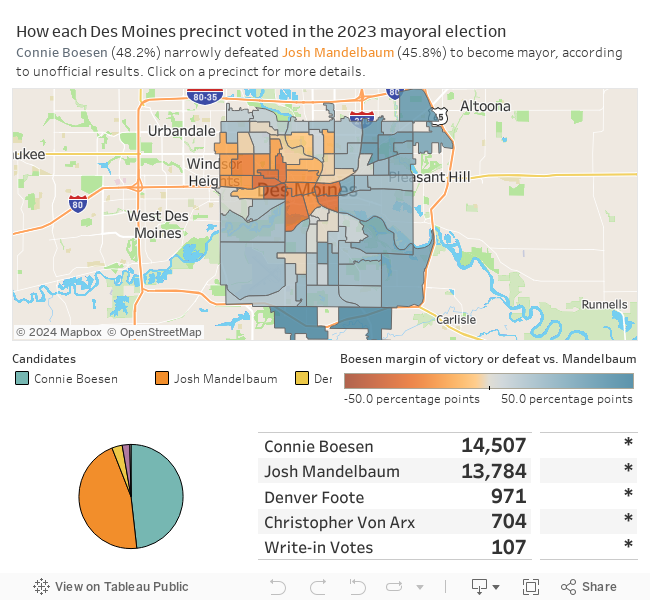How did Connie Boesen win the Des Moines mayor election? These 3 graphics tell the story
For the first time in two decades, Des Moines will have a new mayor, and for the first time ever, it will be a woman: Connie Boesen, who narrowly defeated her city council colleague Josh Mandelbaum, according to unofficial results.
Those results show a gap of fewer than 1,000 votes between the two candidates. Neither earned a majority of the votes, with two other candidates — Denver Foote and Chris W. Von Arx — also receiving several hundred votes.
Four years ago, no candidate attaining a majority would have meant a runoff between the top two finishers. That changed in 2020 following several high-profile runoffs in the city's 2019 elections.
So, this year, Boesen's victory merely awaits the formality of confirmation by county auditors before it's official. Here's a closer look at how she won:
More: What Mayor-elect Connie Boesen plans to do in her first 100 days as Des Moines' mayor
Big margins in outer parts of Des Moines; keeping pace downtown
Mandelbaum's deepest pockets of support were generally in the downtown part of Des Moines, while Boesen's came farther outside the city center.
Most precincts in Des Moines had fewer than 500 votes cast in the mayoral election, and most of those precincts swung Boesen's way. That includes nearly every precinct in wards 2 (northeast) and 4 (southeast) — so the eastern half of the city.
Those wards are the cluster of red and orange dots in the top left section of the chart below. The larger precincts in wards 1 and 3 — shown in blue and green toward the right of the chart — are more evenly distributed between Boesen and Mandelbaum.
Meanwhile, of the eight Des Moines precincts where more than 800 votes were cast, four went to Mandelbaum and four went to Boesen — including three of the four largest precincts in Ward 3 (downtown and southwest), which Mandelbaum represents.
Mandelbaum won most populous wards, but Boesen won the others by more
The city's four wards provide a more simplified look at how Boesen won the election.
Both of the top two candidates won two wards apiece: Mandelbaum won wards 1 and 3, which are roughly west of the Des Moines River and Southwest Ninth Street. Boesen won wards 2 and 4, roughly east of those same landmarks.
More votes were cast in the wards Mandelbaum won — nearly twice as many, in fact. He did best in Ward 1, winning 50.6% of the vote, 7 percentage points ahead of Boesen.
But Boesen's margins of victory in the other wards were significantly larger. She won Ward 2 by 18 percentage points, 55.2% to Mandelbaum's 36.7%, and Ward 4 by nearly 17 percentage points, 54.1% to his 37.3%.
Perhaps most notably, despite winning Ward 3, which he currently represents, Mandelbaum, at 49.4%, did not receive a majority of the votes there.
Boesen received 45.6% of the unofficial vote count in Ward 3, and 5% went to other candidates, keeping the gap between the two leaders narrow enough to overcome in the other parts of the city.
Would a runoff have changed the election's outcome?
Did those other candidates prevent Mandelbaum from winning? That's difficult to say.
There's no way to say whether enough of their supporters would have shifted to Mandelbaum, or voted at all, had those candidates not run.
A runoff would've allowed this exercise to play out, but those are things of the past in Des Moines. We can, however, look at the 2019 mayoral race as a loose example of how much things can change between a general election and a runoff.
The answer, in that case: Not much.
Incumbent Mayor Frank Cownie squeaked ahead of state legislator Jack Hatch by fewer than 200 votes in the 2019 general election. Two other candidates siphoned away more than 10% of the vote — more than twice the impact of this year's distant runners-up.
When, a month later, Cownie and Hatch faced head to head without the other candidates, the result was almost exactly the same: a Cownie win, this time by fewer than 300 votes.
Of course, the 2019 and 2023 races aren't complete parallels. The two other candidates in the 2019 election leaned more conservative than Cownie and Hatch, while this year's election included a more progressive candidate (Foote) alongside Boesen and Mandelbaum.
Regardless, Boesen will be the city's new mayor, and Mandelbaum will still have a voice in municipal matters as he remains in his seat representing Ward 3 on the City Council.
Tim Webber is a data visualization specialist for the Register. Reach him at twebber@registermedia.com, and on Twitter at @HelloTimWebber.
This article originally appeared on Des Moines Register: Exclusive analysis shows how Connie Boesen won Des Moines mayor race


